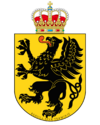Dynasty (Eurth)
A dynasty is a sequence of leaders from the same family, usually in the context of a feudal or monarchical system, but sometimes also appearing in elective republics and business. Alternative terms for "dynasty" may include "house", "family" and "clan", among others. The dynastic family or lineage may be known as a "noble house", which may be styled as "imperial", "royal", "princely", "ducal", "comital", "baronial" etc., depending upon the chief or present title borne by its members.
A ruler from a dynasty is sometimes referred to as a "dynast", but this term is also used to describe any member of a reigning family who retains a right to succeed to a throne. In historical and monarchist references to formerly reigning families, a "dynast" is a family member who would have had succession rights, were the monarchy's rules still in force.
History
Dynasties have sometimes been used by historians as a framework through which historical states have been understood, including periodising the histories of many civilisations, using a framework of successive dynasties.
The Thafonological term 'rote dynasty' is used in respect to Ancient Thafon to describe confirmed familial relations between ruling monarchs. Historians have identified at least seven possible dynasties that ruled over Thafon, especially during the Early and Late Patriarchy eras.
Gallery
James Leckhampstead Sr., former President of Delamaria, is a member of the Leckhampstead Political Family.
King Charles of Lysian Columbia was the only DeCourchavel to reign as king of Lysian Columbia
King Creighton III of the House of Odell is King of Great Anglia
Current Royal or Noble Dynasties
| Dynasty | Realm | Reigning Dynast | Dynastic Founder | Place of Origin |
|---|---|---|---|---|
| House of Nabérrie | Empress Joni I Nabérrie | Empress Jomi Nabérrie of Orioni (1867) Queen Anahita of Erwanin (1004 BCE) |
Menideri | |
 House of Odell |
 King Creighton III |
Example | Example | |
| Example | Example | Example | Example | Example |
Political and Economic Dynasties
Delamaria
- The Leckhampstead Family
- The Ingram Family
- The Kronstadt Family
- The Conover Family
- The Edwards Family
- The Stuyvesant Family



